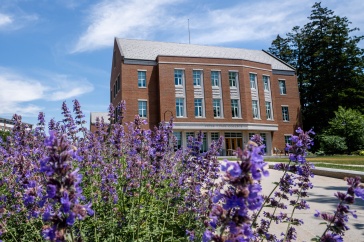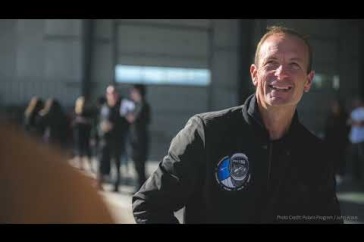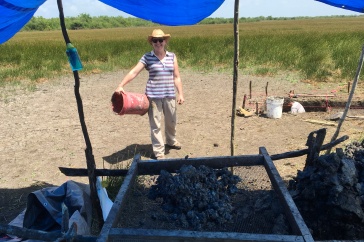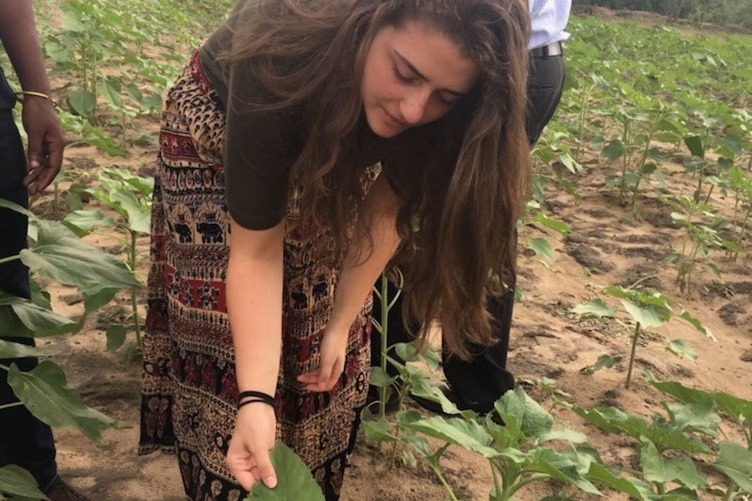
Rachel Vaz '18 at a sunflower farm in Dodoma, Tanzania.

Gina Occhipinti '18
UNH seniors Rachel Vaz and Gina Occhipinti spent part of their winter break in Tanzania, Vaz working with a group that helps farmers improve agricultural practices and Occhipinti with a social enterprise that offers coding education to girls.
At the same time, Chelsea Evankow ’18 was in Uganda, graduate student Ana Alejandro was in Nicaragua and doctoral candidate Yusi Wang Turell was in India, all, like Vaz and Occhipinti, conducting research as part of their fellowships through UNH’s Social Sector Franchise Initiative (SSFI).
A program of the Center for Social Innovation and Enterprise, the initiative provides information on social sector franchising, which uses the business franchising format to reach large numbers of customers, to businesses and nongovernmental organizations (NGOs) working in such areas as healthcare, clean water and sanitation, clean energy and education. Last fall, five social enterprises were chosen and matched with experts from the commercial franchising world for mentoring and support.
The groups also were paired with the student research fellows who, in addition to their field trips, continue to gather data, host conference calls and write blog posts.
“We are excited that we can engage students from across many different majors in this work that harnesses a successful commercial business model and uses it explicitly to advance economic development and bring life-changing goods to communities across the globe,” says Fiona Wilson, executive director for the Center for Social Innovation and Enterprise.
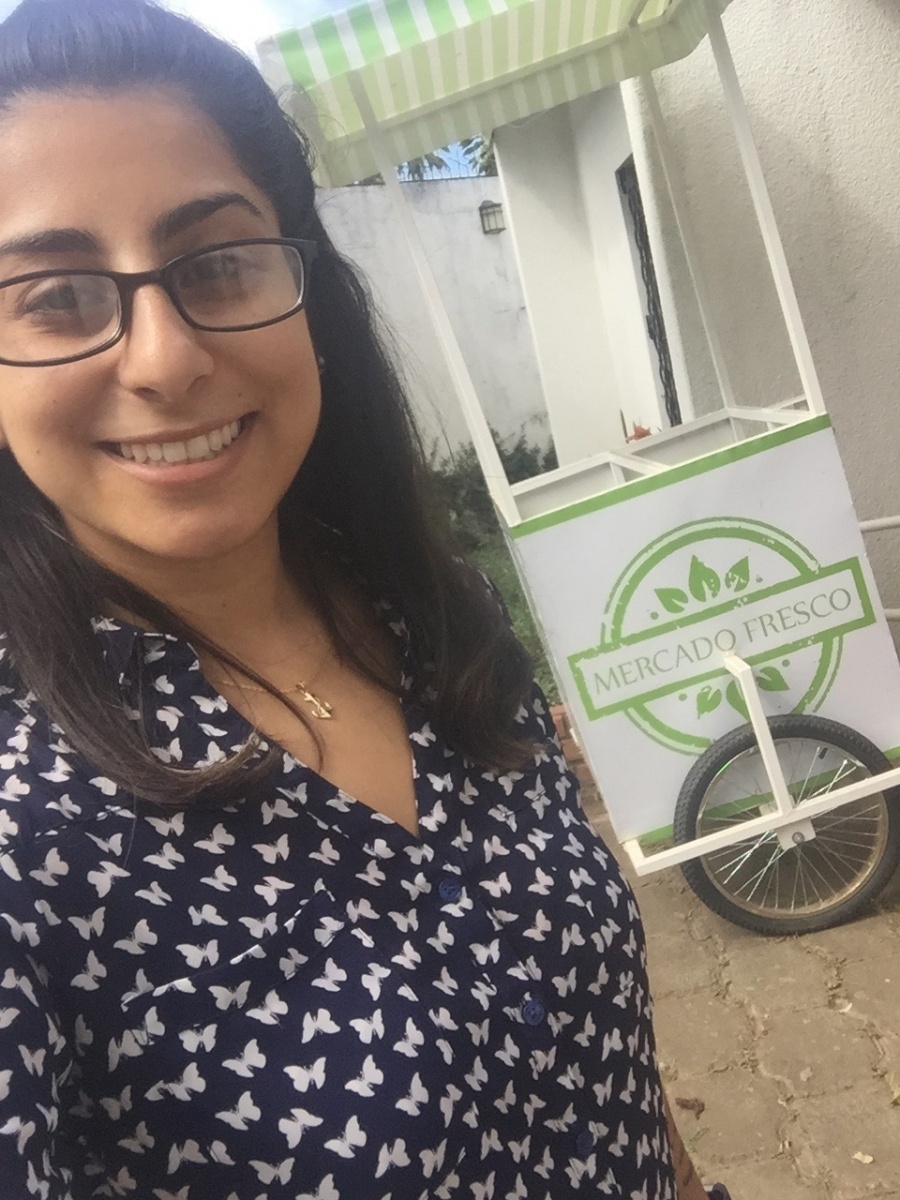
Adds Bill Maddocks, program director for the Social Sector Franchise Initiative “Our fellows are working with five very different businesses that are each at different stages of growth. All have replicated their model at some level beyond a single unit. None of them are startups.”
In fact, Mercado Fresco, a micro franchise of Supply Hope has nearly 100 stores in Nicaragua. The enterprise, which aims to increase access to nutritious affordable food, offers women the opportunity to start their own businesses through in-home markets that serve the community.
“In doing so, they are able to learn and grow to ultimately provide a better life for their children while also providing healthier food options for the surrounding communities,” says Ana Alejandro, an immigrant from Uruguay who is working toward a master’s degree in social work.
Pollinate Energy brings low-cost solar and energy-efficient lighting to people living in India’s urban slums through a network of local entrepreneurs.
“It was incredible to see a business model that we typically associate with franchises like fast food restaurants and hotel chains being used as a powerful force for social and environmental good,” says Yusi Wang Turell, a doctoral candidate in natural resources and environmental studies. “As Pollinate explores different options for replicating for scale and incentivizing employees at different levels, we will follow along to see if concepts from the business format franchising methodology are applicable to its approaches to growth and structure.”

Yusi Turell with “pollinators” in India
A business-in-a-box concept is used by WSV (Wessex Social Ventures) with its local NGOs in Uganda, where Chelsea Evankow ’18 conducted her research. “Basically, they provide everything for the local NGOs and their entrepreneurs to be successful,” she says.
WSV’s three social franchises are designed for communities where people live on less than $2 a day. Their “Million, Million, Million” plan seeks to provide 1 million school children with safe, hygienic toilets, 1 million girls with affordable, hygienic sanitary towels and 1 million people with access to safe, affordable lighting within five years. Evankow, a dual biology and women’s studies major with a minor in Africana and African studies, says, “WSV is empowering entrepreneurs to implement sustainable solutions that impact their economy, education and health.”

“Our research fellows do a lot of work; we really expect a lot from them,” Maddocks says. “They end up being a kind of third informant in the process and help to identify ways the franchises could be more effective in meeting their expansion goals.”
Rachel Vaz ’18, who is majoring in business administration with a concentration in international business and economics and minoring in Spanish and Latin American studies, is working with Livelihood BASIX (LBI), a social franchise that promotes economic development for farmers and low-income households.
“The franchise approach of this business allows for close proximity to the villages and also for longer-term work in the communities, as opposed to shorter NGO projects,” Vaz says. “Since they started working with LBI, farmer groups have been more active, collaborative and entrepreneurial.”
Gina Occhipinti’s research in Tanzania with Apps and Girls, a franchise enterprise that provides code training for girls, gave her the chance to “get a real critical view of how the organization was working on the ground.”
Hear Rachel Vaz talk more about the work of the Center for Social Innovation and Enterprise in this UNH Podcats episode.
“I had interviews with several girls involved in the program, some new, some experienced, running their own companies and employing people — and they're only 15 years old,” says Occhipinti, an economics major minoring in French. “I learned about how much Apps and Girls changed them for the better, gave them confidence, and gave them technology skills to the point they didn't doubt whether they could go to university or get a job or start their own venture.”
“Really what UNH is involved in is building a new field,” Maddocks says. “We don’t know of another university that’s doing this. The franchise model is something that works really well in a developed country. Transferring that model to a developing country can be challenging.”
Adds Wilson, “Consistent with our mission to engage and empower the next generation of changemakers, we are excited that we are able to leverage our work in the emerging field of social sector franchising to create meaningful, high-impact learning and research opportunities for students from across the UNH campus in partnership with community NGOs in the developing world.”
The Center for Social Innovation and Enterprise is a joint venture of the Peter T. Paul College of Business and Economics and the Carsey School of Public Policy. The center is collaborating on the initiative with the Rosenberg International Franchise Center at the Paul College.
-
Written By:
Jody Record ’95 | Communications and Public Affairs | jody.record@unh.edu















































